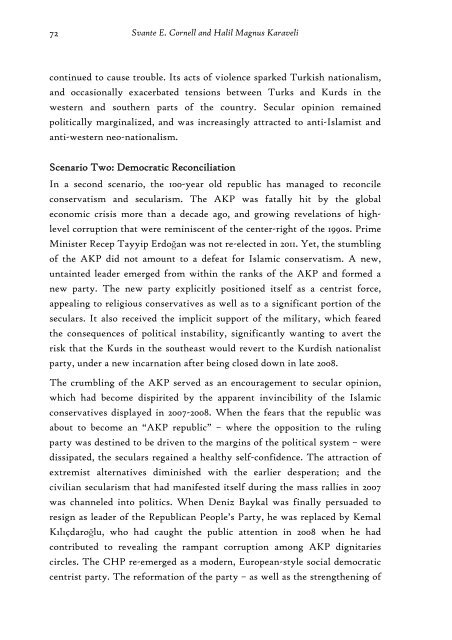2008_10_SRP_CornellKaraveli_Turkey
2008_10_SRP_CornellKaraveli_Turkey
2008_10_SRP_CornellKaraveli_Turkey
Create successful ePaper yourself
Turn your PDF publications into a flip-book with our unique Google optimized e-Paper software.
72<br />
Svante E. Cornell and Halil Magnus Karaveli<br />
continued to cause trouble. Its acts of violence sparked Turkish nationalism,<br />
and occasionally exacerbated tensions between Turks and Kurds in the<br />
western and southern parts of the country. Secular opinion remained<br />
politically marginalized, and was increasingly attracted to anti-Islamist and<br />
anti-western neo-nationalism.<br />
Scenario Two: Democratic Reconciliation<br />
In a second scenario, the <strong>10</strong>0-year old republic has managed to reconcile<br />
conservatism and secularism. The AKP was fatally hit by the global<br />
economic crisis more than a decade ago, and growing revelations of highlevel<br />
corruption that were reminiscent of the center-right of the 1990s. Prime<br />
Minister Recep Tayyip Erdoğan was not re-elected in 2011. Yet, the stumbling<br />
of the AKP did not amount to a defeat for Islamic conservatism. A new,<br />
untainted leader emerged from within the ranks of the AKP and formed a<br />
new party. The new party explicitly positioned itself as a centrist force,<br />
appealing to religious conservatives as well as to a significant portion of the<br />
seculars. It also received the implicit support of the military, which feared<br />
the consequences of political instability, significantly wanting to avert the<br />
risk that the Kurds in the southeast would revert to the Kurdish nationalist<br />
party, under a new incarnation after being closed down in late <strong>2008</strong>.<br />
The crumbling of the AKP served as an encouragement to secular opinion,<br />
which had become dispirited by the apparent invincibility of the Islamic<br />
conservatives displayed in 2007-<strong>2008</strong>. When the fears that the republic was<br />
about to become an “AKP republic” – where the opposition to the ruling<br />
party was destined to be driven to the margins of the political system – were<br />
dissipated, the seculars regained a healthy self-confidence. The attraction of<br />
extremist alternatives diminished with the earlier desperation; and the<br />
civilian secularism that had manifested itself during the mass rallies in 2007<br />
was channeled into politics. When Deniz Baykal was finally persuaded to<br />
resign as leader of the Republican People’s Party, he was replaced by Kemal<br />
Kılıçdaroğlu, who had caught the public attention in <strong>2008</strong> when he had<br />
contributed to revealing the rampant corruption among AKP dignitaries<br />
circles. The CHP re-emerged as a modern, European-style social democratic<br />
centrist party. The reformation of the party – as well as the strengthening of


